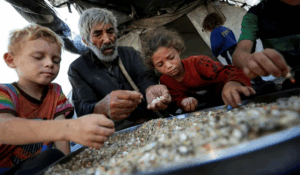Even for Israel, the country of survivors, it’s easy to cross the line between victim and perpetrator

Displaced Palestinians who have not received humanitarian aid pick out grains of leftover food in Gaza, 28 July 2025
Iris Leal writes in Haaretz on 28 July 2025:
Eighty years after the Allies liberated the extermination camps and the pictures of the starved survivors, bodies of skin and bones, sunken cheeks and empty eyes were seared into the world’s consciousness; similar pictures are streaming out of Gaza.
Images tend to be perceived as echoes of their predecessors. It’s possible to remember the pictures of the starved internees at a Serbian extermination camp in Bosnia in 1992, but they also recall earlier atrocities. And because every nation turns to the gallery of images in its archive of atrocities, a Jew cannot help but ask in horror, in horror: We did this, how did it happen?
The answer to this haunting question lies partly in the words of the Jewish writer and Auschwitz survivor Primo Levi, who until his dying day was aware that history can repeat itself: “Because Auschwitz was an act of man and we are men.”
But given the state of the world, it seems that we did not pay enough attention to his warning and did not take it seriously, least of all in Israel. Here, in the country of survivors, we believed that we were immune, and Levi’s words threatened not only to rob us of our exclusivity as those who suffered the worst crime of the 20th century, but also hinted that we were liable to find ourselves in the role of the perpetrator.
But Levi was correct. The Holocaust was a unique human and historic event, but it was an act of man, and it’s disturbingly easy to cross the line between victim and perpetrator. It will take years to analyze how a trauma like October 7, which for many conjured up images of the pogroms, unleashed something that was apparently dormant in Israeli society.
The truth is that anyone who wanted to could have understood that something unusual was happening from the documentation from the first days of the war in Gaza. It deepened following the resumption of the war in March, when the media concealed from the public how entire families were wiped out by the shelling, crushed under the rubble of their homes or dying because of the deliberate destruction of life-saving infrastructure.
In this war, the army did not stop inventing different kinds of death: by gunshot, by suffocation, by preventing access to infant formula. And then came the pictures of the muselmann (“walking skeleton” in the lingo of Nazi concentration camp inmates) on the front pages of newspapers like the right-wing Daily Express or the conservative Le Monde. A Pietà of our own making: a mother holds a baby who is all skin and bones with a plastic bag serving as a substitute for a diaper.
At the start of the war, I watched the film “The Zone of Interest” by Jonathan Glazer about the family of Rudolf Höss, whose home bordered Auschwitz. The constant smoke billowing from the chimneys and the skeletal human remains in the river testified to the factory of death that was working efficiently, while Höss’ family sat down for dinner and tended the garden. My companion and I briefly looked at each other, locked in a mutual understanding of the parable.
Although Gaza wasn’t Auschwitz, ministers’ remarks about establishing a concentration camp or ethnic cleansing (“Gaza will be wholly Jewish”) and the promises that it would be leveled do not help silence the associations. We eat dinner, and a short distance away, people have not eaten for four days. And by going to the food distribution hub, they risk being shot and killed by some commander who feels threatened by the starving crowd and fires on them to disperse them.
After a week in which I heard nothing from him, my contact in Gaza wrote that he was in poor condition, weak and exhausted and that his mental and emotional state were as bad as they had ever been. I received his message at my family’s Friday night meal. He had replied late to my repeated question: Yes, I ate, but only once a day. And I look at his message in wonder and think that the man I know is fading away because my country is starving him.
This article is reproduced in its entirety
